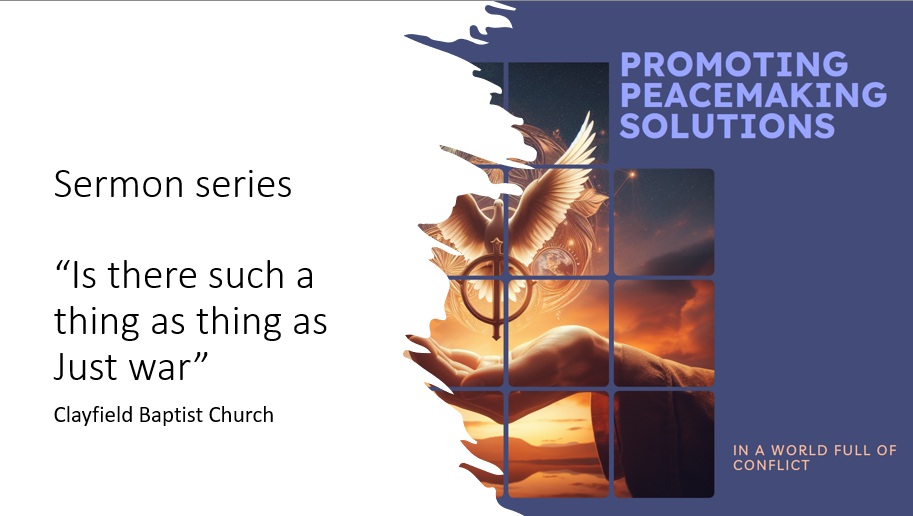In exploring the concept of a just war, this sermon shifts its focus towards alternative possibilities and the prevention of conflict.
Emphasizing Christian peacemaking, the discourse examines the effectiveness of nonviolent approaches and showcases evidence of their success. Delving into the question of what makes Christian peacemaking impactful, the sermon encourages reflection on proactive measures that not only avert the onset of war but also contribute to fostering peaceful solutions.
Joseph SamrajA
21/1/2024 10:55:37 am
All other religions say kill the enemy the evil doers their God’s promote revenge and avenge the wrong done to them but Christians are seen as weak or cowardly because they don’t fight back ! Question Does God intervene to protect Christians in this life as he did in Old Testament and New Testament when they prayed for protection?
David Champness
22/1/2024 12:30:48 pm
From the Baptist perspective, the conviction in divine intervention and God’s safeguarding of Christians is firmly rooted in biblical teachings. As Baptists, we uphold the authority of the Bible and often turn to passages emphasizing God’s role as a protector and refuge for His people.
For instance, in the Old Testament, Psalm 91:4 (NIV) illustrates this belief: “He will cover you with his feathers, and under his wings, you will find refuge; his faithfulness will be your shield and rampart.” Similarly, in the New Testament, Matthew 28:20 (NIV) echoes the idea of God’s constant presence and protection, with Jesus stating, “And surely I am with you always, to the very end of the age.”
However, it is essential to acknowledge the reality that Christians are not immune to adversity, as evident in the first Christian martyr, Stephen, described in Acts 7:54-60.
On a personal note, I can attest to God’s protection in my own life. I have experienced situations where, by all accounts, I should not have survived were it not for God’s intervention. Yet, it is crucial to recognize that Christians are not shielded from the presence of evil in this world.
Therefore, I emphasize the significance of prayer and fostering a personal relationship with God. Through prayer, Christians can actively seek God’s guidance, protection, and intervention in their lives. Additionally, maintaining a kingdom-focused perspective is crucial. While life on earth is impactful, it is transient. Our ultimate existence lies beyond this temporal realm. By storing our treasures in heaven and maintaining an eternal focus, we align ourselves with God’s blessings.
Joseph SamrajA
21/1/2024 11:09:19 am
Australian Defence forces have seen a big decline in recruitment despite offering so many perks and benefits is joining the military means Christian young people are required for war to fight and kill how can a soldier be a Pacifist Jesus healed a Roman Centurians servant Praising his Great Faith
David Champness
22/1/2024 01:36:56 pm
While it’s true that there has been a decline in recruitment numbers for the defense force, I question the notion that this implies Christian young people are obligated to participate in war and engage in combat (REQUIRED and MEANS above). We must ask ourselves why we would encourage Christians to take on roles that even those without religious affiliations may be hesitant to pursue, such as joining the military.
Ultimately, the decision to join the defense force is a personal one, applicable to individuals and their religious convictions. However, as a church or as Christian leader, it is not within our purview to assert that Christians should actively seek military roles. Instead, I would argue that Christians should be encouraged to pursue vocations where their unique skills and values can make a distinctive impact. I would also argue, that the Christian should be listening to Gods will for him or her, and not the military advertising or recruitment videos to decide.
Currently, there is a decline in the number of full-time missionaries. This is a role that only Christians can fulfill, and as such, I believe we have a responsibility to motivate and support individuals to undertake these Godly roles in our society and abroad.
Regarding your second point about Jesus praising a Roman Centurion’s great faith, it’s accurate that Jesus acknowledged this man’s faith. However, using this incident to argue that Jesus supported war is a common mistake among Christians, it is called making an argument from silence. “Making an argument from silence” assumes that Jesus supports a topic simply because He didn’t explicitly oppose it—is flawed.
For example, just because Jesus didn’t address the Roman centurion’s attire (Pteruges – Roman name for the skirt that they wore) doesn’t mean He endorsed it. To argue from silence, I could say than jesus was wanting us all to wear skirts as men. Or maybe Jesus wanted us to…. The argument is endless from silence. The absence of a directive should not be equated with approval. In contrast, when Jesus emphasizes the command to love your enemies, it carries more weight than attempting to draw conclusions from what He didn’t specifically mention, such as to the Roman soldier.
In essence, the strength of an argument lies in a command or deliberate teaching on a particular topic, rather than relying on the absence of explicit instructions in Scripture.
Hope this makes sense.



Leave A Comment